rlaexp.com
LEADERSHIP entry point
“To know something (leadership or anything else),
to really understand something important,
one must look at it from sixteen different angles.
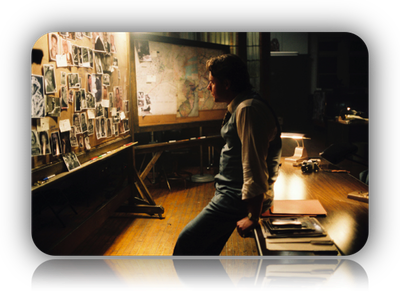
People are perceptually slow,
and there is no shortcut to understanding;
it takes a great deal of time.” read more from Peter Drucker
Getting a broad view
evidence wall and timeline larger ↓

Leadership vs. Management
Leadership: More Doing Than
Dash
The Mystique of the Business
Leader

The site primarily uses Peter Drucker’s top of the food-chain work.
It’s an exposure “prototype.”

“The only definition of a leader is
someone who has followers” — the usual suspect
The Spirit of Performance

Leadership is not by itself good or desirable.
Leadership is a means.
Leadership to what end is thus the crucial question.
And this ↑ requires ongoing preparation
History knows no more charismatic leaders than this century’s triad of Stalin, Hitler, and Mao—the misleaders who inflicted as much evil and suffering on humanity as have ever been recorded
The test of a leader is not what happens during his lifetime but what happens when he leaves continue

This page contains a collection of
attention-directing though fragments,
and the following links.
People decisions — the real control of an organization
The Spirit of Performance
From … to the responsibility-based organization
Peter Drucker on Leadership — 2004
Leader of the Future
Drucker and Me
The CEO in the New Millennium
About leadership
What needs doing?
Management Challenges for the 21st Century
Managing in the Next Society
Management Worldviews
To get an awareness
of some of rlaexp.com’s leadership content,
try a Google site search
by clicking the previous link or
by inserting the following text
in Google’s search box: leadership site:rlaexp.com

Leadership exists within a changing world
Getting beyond the BS of leadership literature — McKinsey Quarterly
Imagine the outcome for someone in 1930, 1950, 1970, 1990 or 2005
confidently and steadfastly acting on the assumption that
tomorrows were going to be like yesterdays — an extension of the past.
What would be the appropriate assumptions today?
Only 11% of the Fortune 500 companies from 1955 still exist today, while the average time that companies stay in the top 500 has fallen from 75 years to 15 years ::: source
Introduction to navigating a world moving toward unimagined futures
A future facing mental radar system is needed
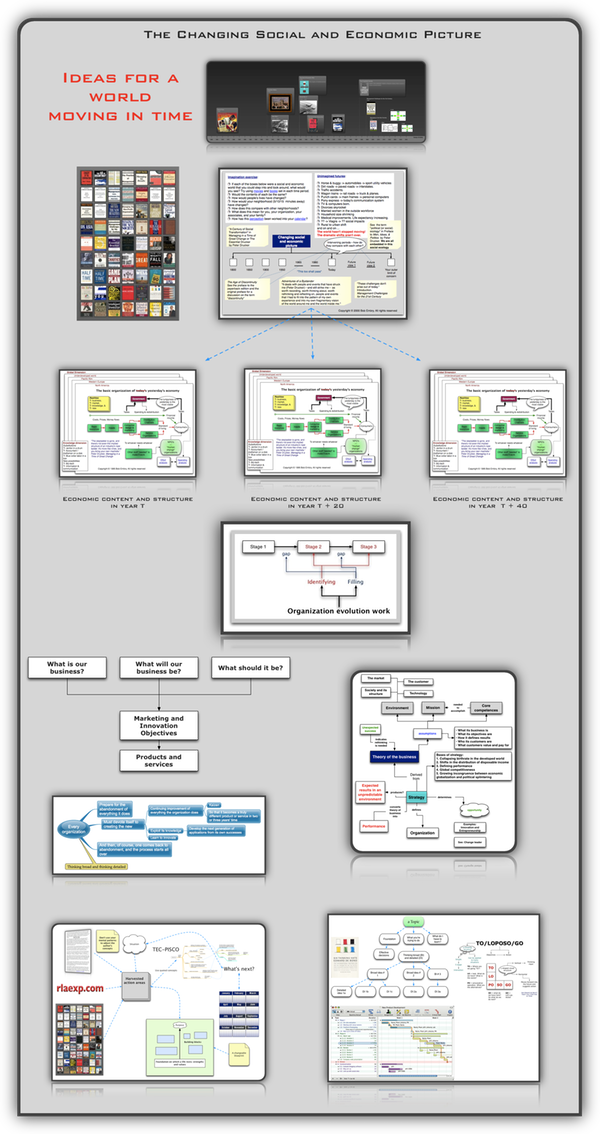
Larger view of the big picture action system
We are embedded in a knowledge society,
a society of organizations, and a network society
that is moving in time …

There is no reason to believe
that tomorrowS will be extrapolations
of yesterdayS
New realities rising and falling
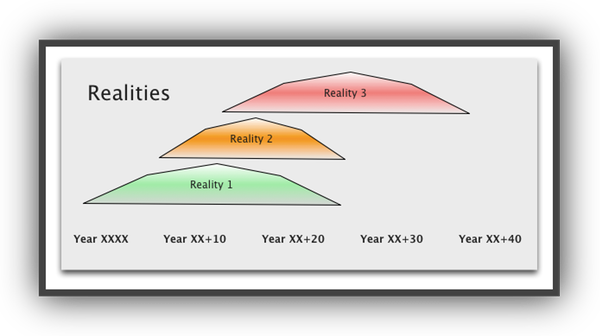
Your organization
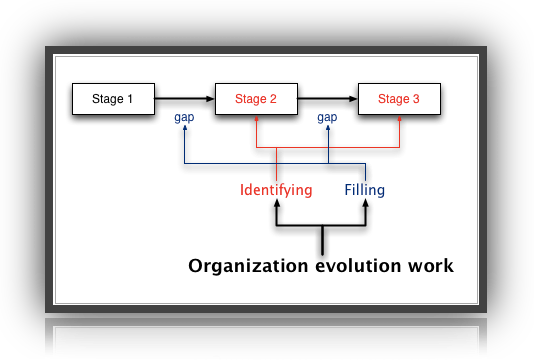
Other organizations that may intersect with yours
somewhere down the road
Examples: Apple, Samsung, Blackberry, Nokia (a clash of “Titans”)

… the organization of the post-capitalist society of organizations
is a destabilizer.
Because its function is to put knowledge to work
—on tools, processes, and products;
on work;
on knowledge itself—
it must be organized for constant change.
It must be organized for innovation;
and innovation,
as the Austro-American economist
Joseph Schumpeter (1883-1950) said,
is “creative destruction.”
It must be organized for systematic abandonment
of the established, the customary, the familiar,
the comfortable
— whether products, services, and processes,
human and social relationships, skills,
or organizations themselves.
It is the very nature of knowledge
that it changes fast and
that today’s certainties
will be tomorrow’s absurdities. — Peter Drucker
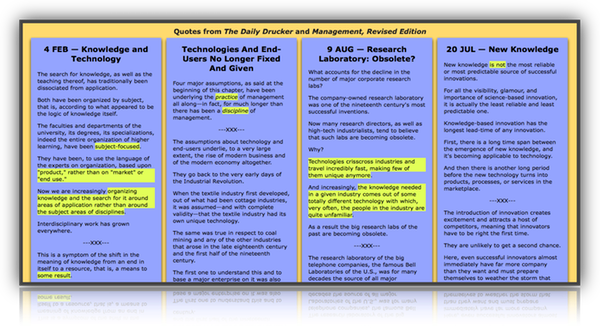
More on the modern chaos above
From computer literacy to information literacy — a trail-head
Production

Thoughts about the future
The future depends on what’s between each individual’s ears.
Foundations For Future Directed Decisions
Extrapolating yesterdayS is a fruitless attempt to predict the future.
“Trying to predict the future
is like driving down a country road at night
with no headlights on and
looking out the back window”
“We know only two things about the future.
It cannot be known.
It will be different from what exists now
and from what we now expect”
Peter Drucker
The actual results of action are not predictable.
Indeed, if there is one rule for action,
and especially for institutional action,
it is that the expected results will not be attained.
The unexpected is practically certain.
But are the unexpected results deleterious? Read more
The future that has already happened

Snippets from the about Management page
In less than 150 years, management has transformed the social and economic fabric of the world’s developed countries.
It has created a global economy and set new rules for countries that would participate in that economy as equals.
And it has itself been transformed
The center of modern society is the managed institution.
The managed institution is society’s way of getting things done these days.
And management is the specific tool, the specific function, the specific instrument, to make institutions capable of producing results.
The institution, in short, does not simply exist within and react to society.
It exists to produce results on and in society.
The institution is itself an organ of society and exists only to contribute a needed result to society, the economy, and the individual.
Organs, however, are never defined by what they do, let alone by how they do it.
They are defined by their contribution.
… It should have been obvious from the beginning that management and entrepreneurship are only two different dimensions of the same task.
… It also follows that managing a business must be a creative rather than an adaptive task.
The more a management creates economic conditions or changes them rather than passively adapts to them, the more it manages the business
… for constantly pushing back the limitations of economic circumstances on the enterprise’s ability to contribute.
And only to the extent to which it masters the economic circumstances, and alters them by consciously directed action, does it really manage.
“The customer never buys what you think you sell. And you don’t know it. That’s why it’s so difficult to differentiate yourself.” — Drucker
Indeed, the first task of management is to define what results and performance are in a given organization — and this, as anyone who has worked on this task can testify, is in itself one of the most difficult, one of the most controversial, but also one of the most important tasks
It is, therefore, the specific function of management to organize the resources of the organization for results outside the organization
To manage a business means, therefore, to manage by objectives
The right definition of a manager is one who “is responsible for the application and performance of knowledge.”
The function of organizations is to make knowledges productive.
Organizations have become central to society in all developed countries because of the shift from knowledge to knowledges.
The more specialized knowledges are, the more effective they will be.
Knowledges by themselves are sterile.
They become productive only if welded together into a single, unified knowledge.
To make this possible is the task of organization, the reason for its existence, its function.
The productivity of knowledge is going to be the determining factor in the competitive position of a company, an industry, an entire country.
… Rather, they maximize the wealth-producing capacity of the enterprise.
“AS WE ADVANCE deeper into the knowledge economy, the basic assumptions underlying much of what is taught and practiced in the name of management are hopelessly out of date. They no longer fit reality.” — Management’s New Paradigms
“Despite all the outpouring of management writing these last twenty-five years, the world of management is still little-explored.”

Somewhere down the road: One’s Own Responsibility
“ … The most important thing that underlies all these practices is that individuals — and especially knowledge people — who manage to keep themselves effective and who manage to keep on growing and changing take responsibility for their development and their placement.
This may be the most novel conclusion.
And it may be the one that is most difficult to apply.
Today’s organization, whether it is a business or a government agency, is still based on the assumption that the organization is responsible for placing the individual and for providing the experiences and challenges that the individual needs.
The best example of this I know is the personnel department in the typical, large Japanese company—or the prototype on which it has been modeled or the human resources department in a traditional army.
I know no more responsible group of people than those in the typical Japanese human-resources department.
Yet they will, I think, have to learn to change.
Instead of being decision makers, they will have to become teachers, guides, counselors, advisers.
The responsibility for the development of the individual knowledge worker, and for his or her placement, will, I am convinced, have to be taken by the individual.
It will have to become very much the responsibility of the individual to ask,
What kind of assignment do I now need?
What kind of assignment am I now qualified for?
What kind of experience and what kind of knowledge and skill do I now need to acquire?
The decision, of course, cannot be that of the individual alone.
It has to be made in contemplation of the needs of the organization.

It also has to be made on the basis of an outside appraisal of the strengths, the competencies, the performance of the individual.”
Chapter 47, Management, Revised Edition
The Daily Drucker — a broad thoughtscape

And now to the main acts ↓ …
The CEO in the New Millennium
Peter Drucker on Leadership — 2004
About leadership
What needs doing?


To create a rlaexp.com site search, go to Google’s site ↓
Type the following in their search box ↓
your search text site:rlaexp.com

What needs doing?

Why donate?
Copyright 1985 through 2022 © All rights reserved | bobembry bobembryusa bobembry.usa | bob embry robert embry | “time life navigation” © #TimeLifeNavigation | “life TIME investment system” © #LifeTimeInvestmentSystem | “career evolution” © #CareerEvolution | “life design” © #LifeDesign | “organization evolution” © #OrganizationEvolution | “brainroads toward tomorrows” © #BrainroadsTowardTomorrows | “foundations for future directed decisions” © #FoundationsForFutureDirectedDecisions | #rlaexpdotcom © | rlaexpdotcom ©
#rlaexp.com = rla + exp = real life adventures + exploration or explored
exploration leads to explored
Examples ↑ can be found through web searches, Wikipedia,
Pinterest and the daily news
|
![]()
